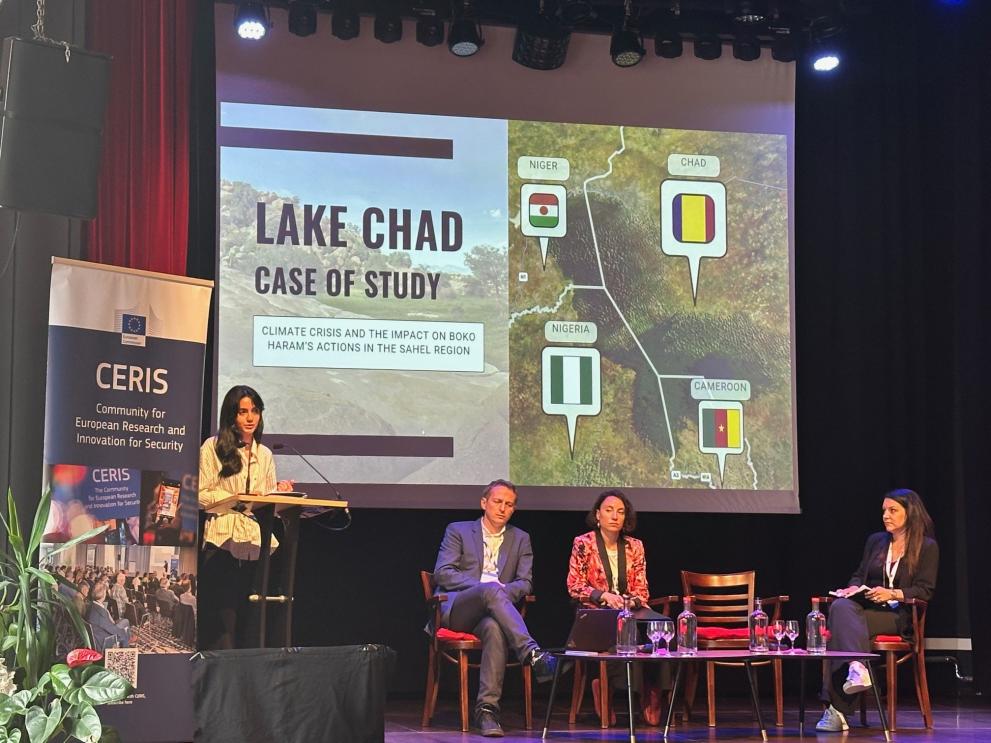
On the 21 May 2024, DG HOME’s Security Research and Innovation Unit, under the CERIS banner (the Community for European Research and Innovation for Security), brought together about 70 practitioners, researchers and representatives from civil society to discuss the impact of climate change on security practitioners and their operations. As highlighted in the welcome address by Marta Cygan, Director of Innovation and Audit in DG HOME, climate change is a multi-faceted challenge and it is therefore of paramount importance to identify the most pressing security implications and find corresponding solutions. It is also a global issue that demands action from all of us. The European Commission has risen to this challenge, with the goal of the EU becoming a climate-resilient society by 2050.
The starting point for the discussion was impact on communities. The experts from the Hague University, Alto University, Haifa University, and GRUPOETRA looked at different climate factors influencing group and individual behaviour, climate-driven relocations of populations and their consequences for effected communities, limited access to resources, and various scenarios for local tensions to escalate into crises, or even prolonged conflicts. Panellists highlighted its profound effects, and lessons to be drawn for community policing trainings and strategies. As revealed during the discussion, climate change may have positive side, for example serving as a unifying cause for communities, fostering collective action.
Further debate shed light on the ways organised crime is exploiting the situation, adding another layer of complexity to the challenge. In this regard, project PERIVALLON shared its findings concerning illegal dumping of pollutions, and picture which emerges from the satellite data. These were later complemented with data from twin project EMERITUS, providing additional information on cross border waste trafficking, but also recommendations facilitating cooperation between different law authorities. Building on this theme the discussion delved into the nexus between climate change and organised crime and terrorism. Experts from EUROPOL, the Basel Institute on Governance, and the United Nations Office of Counter Terrorism discussed further environmental crimes, "green corruption,", frauds against environmental funds, and push and pull factors in action here. A striking case study of the Lake Chad, presented by the Universidad Pontificia de Comillas de Madrid, demonstrated how Boko Haram leverages shrinking natural resources to control and recruit local population, which already led to a dramatic rise in number of terrorist attacks, and victims. Finally, communication was identified as a major tool used for exploitation of confusion, to spread disinformation, leveraging grievances around climate adaptation policies, and undermining trust in institutions and democratic governance.
The concluding debate, featuring security practitioners gathered around ENLETS, FRONTEX and CBRA, focused on the adaptive measures taken by police, border guards, and customs officials in response to climate change. Discussions covered human resources, structural and equipment adaptations, such as the transition to e-mobility, enhancing energy efficiency of buildings, introduction of new uniform materials, or implementing new working methods. They also addressed staff training and leadership development. As the discussants agreed, there are numerous obstacles to achieve sustainability goals, many of them are unique to security domain, and not experienced in the civilian processes, however going sustainable has the long-term potential of increasing operational effectiveness. Several future-proof strategies, were covered including the adoption of alternative fuel vehicles (eFuel, LPG, H2, electricity), improvement of energy efficiency in police buildings through insulation and solar power, and development of an international network of experts to share best practices and innovations in materials and logistics.
The participants of the event had a unique chance to learn how the climate change is impacting the security domain, as well as how impact on society further reflects on the crime types and volumes, and what the security practitioners are doing about it, not only to effectively serve and protect, but also to limit their own environmental footprint with the help of research.
Details
- Publication date
- 6 May 2024
- Author
- Directorate-General for Migration and Home Affairs
